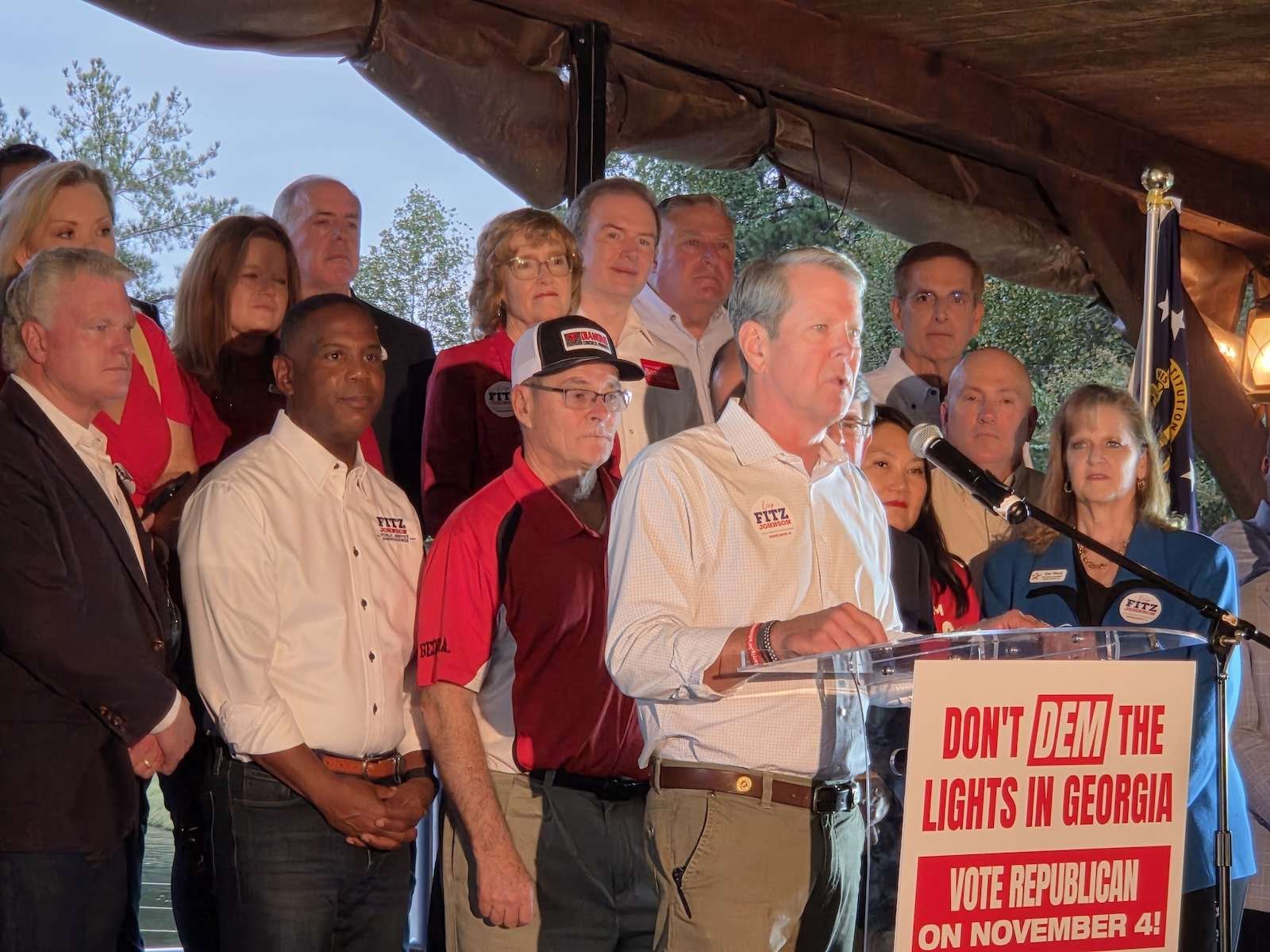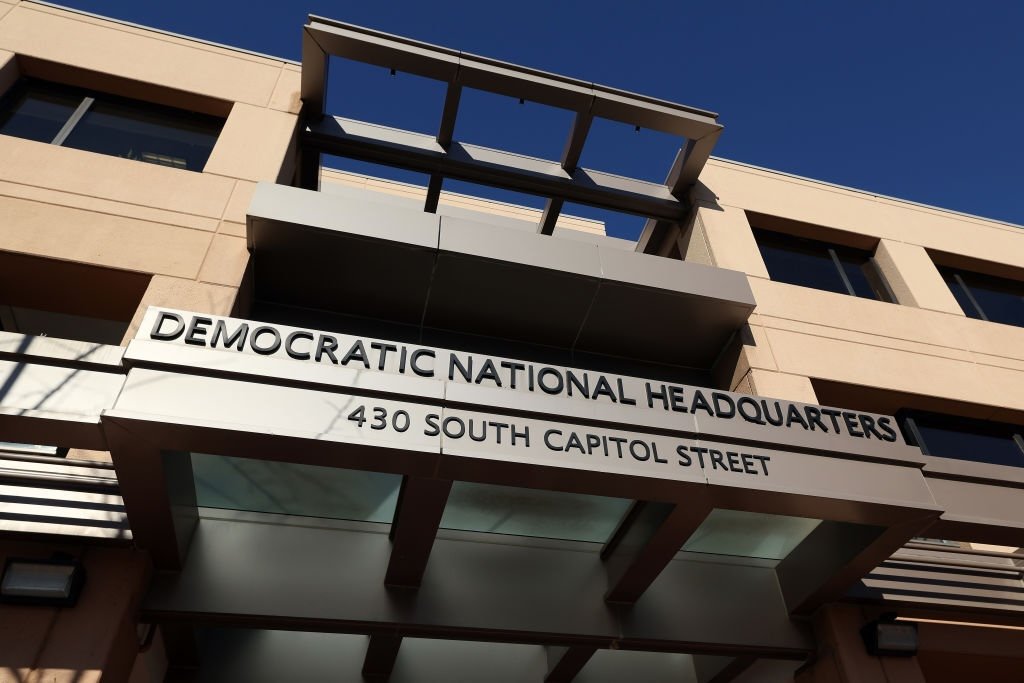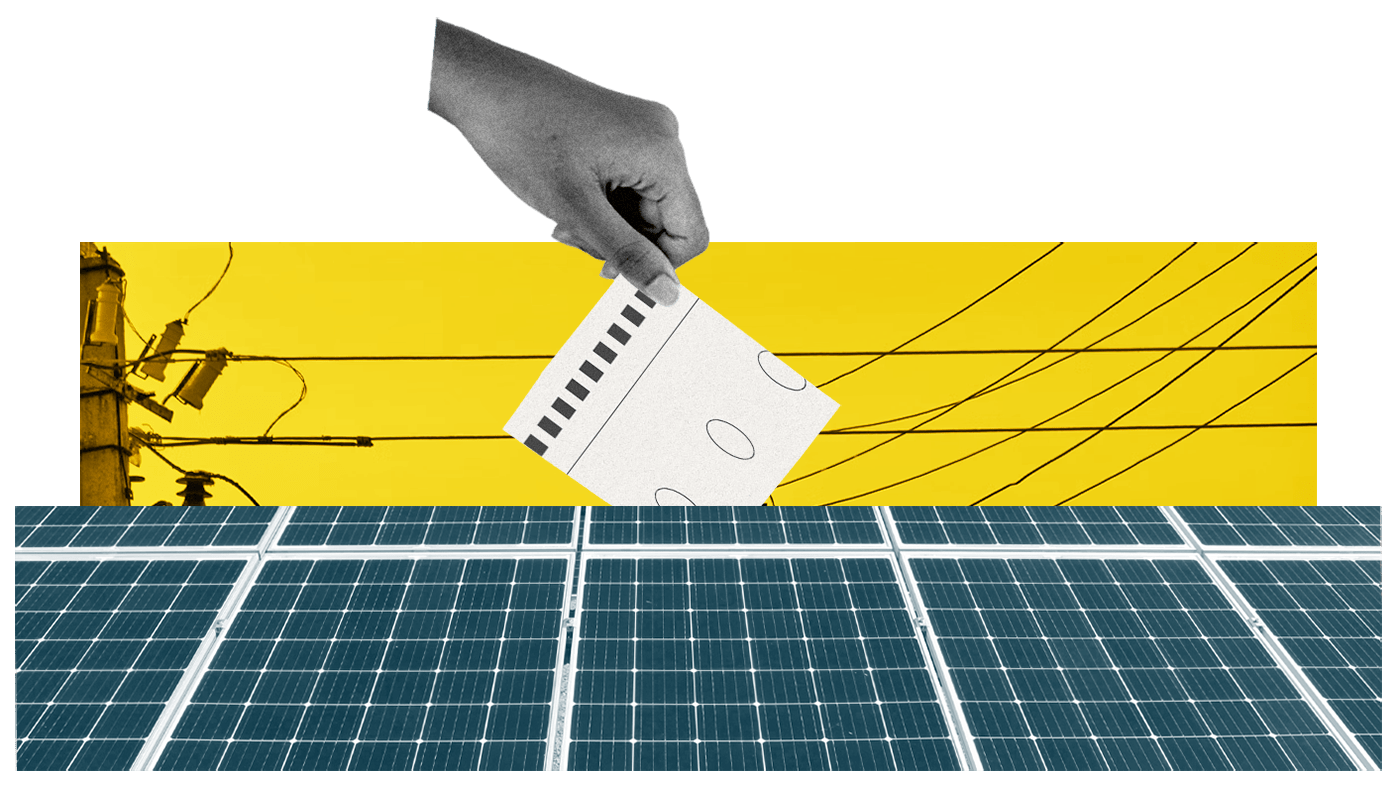This coverage is made possible through a partnership between Grist and WABE, Atlanta’s NPR station.
Georgians are currently voting in rare off-year elections for two seats on the Public Service Commission — the only statewide races on the ballot this year. More Democrats are expected to turn out to vote because Democratic strongholds like Atlanta are electing a mayor and city council members. In June, about twice as many Democrats as Republicans turned out for the party primaries.
Republicans see a risk of losing seats they’ve held for two decades and opening the door to further losses. Both parties are looking ahead to next year, when the governor’s office and a U.S. Senate seat are on the ballot, and see the PSC race as something of a bellwether. That all has Republicans showing some nerves.
Recently, some of Georgia’s top Republicans gathered in Forsyth County, about 40 minutes outside Atlanta, for a show of party unity and patriotism. Local and state officials stood on risers behind the podium while longtime Public Service Commissioner Bubba McDonald led the small crowd in a rendition of “God Bless the USA.”
McDonald and his fellow members of the commission charged with regulating Georgia’s largest electric utility, Georgia Power, are all Republicans. Standing behind a sign reading “Don’t DEM the lights in Georgia,” the evening’s speakers urged the crowd to keep it that way.
“We are all united in one goal, and that is to send the message that Georgia is closed to the Democratic Party,” said state party chair Josh McKoon.

Focused as they were on the broader party politics, the Republicans rallying their base in Forsyth County also shone a spotlight on the PSC’s role in determining the cost and sources of energy in Georgia — critical positions that traditionally operate in relative obscurity.
“You hear everybody talk about how important it is that our state continue to be the number one state to do business, raise a family, have a job,” McKoon said. “The backbone of that is reliable energy.”
For the Republican incumbent commissioners, reliable energy means fossil fuels. Last year, they greenlit new gas-fired turbines and earlier this year, they voted to approve a Georgia Power plan that would keep coal plants open past their previously approved retirement dates, both to meet rising demand that comes mostly from data centers.
“If these two Democrats get elected, they are going to be at war with our fossil plants, and we have a lot of them,” Commissioner Tim Echols told the rally crowd. “These fossil plants are absolutely critical to our reliability, and we can’t allow anyone to take the helm of the Public Service Commission and shut these things down.”
Echols has championed solar, nuclear, and other alternative energy sources since joining the commission in 2010, but sees natural gas in particular as an important part of the state’s overall energy mix.
Fellow Commissioner Fitz Johnson had similarly dire warnings about the potential consequences of Democrats joining the commission.
“We are not gonna let them California our Georgia,” Johnson said after pointing to large rate hikes in states like California and New York.
But Johnson and Echols have voted to raise rates in Georgia, too. Georgia Power bills have gone up six times in the last three years: three times as part of an overall rate hike, twice to pay for new nuclear reactors at Plant Vogtle, and once to cover high natural gas prices. Earlier this year, the commission voted unanimously to freeze base power rates for the next three years — though bills will still be adjusted next year for fuel prices and hurricane cleanup costs, which could mean a further increase.
The state Democratic Party is focused largely on these rate hikes in its bid to unseat Echols and Johnson.
“These two Republicans that are running right now never once said, ‘No’ — not one time — to a rate hike request,” said state party chair Charlie Bailey. “We view that as frankly not even a partisan thing. That is — those folks ought not to be in office.”

Both Democratic candidates view expanding renewable energy and exploring alternatives like better management of energy demand, installing rooftop and community solar, and working with neighboring utilities as keys to both meeting rising demand and stemming skyrocketing costs.
Those options, said Democratic candidate Peter Hubbard, are “woefully underrepresented in the current planning process.”
“What fills that gap is gas-fired capacity, extensions of coal plants, and generally things that are less affordable and less reliable,” he said.
Democrat Alicia Johnson favors similar solutions as both affordable and reliable — and as a protection against climate-fueled weather disasters like last year’s Hurricane Helene, which took down major parts of Georgia’s grid and left some areas without power for weeks.
“We need to invest in a smarter, more resilient grid that’s capable of handling the extreme weather that Georgia experiences while also expanding that access to clean energy,” she said. “I believe that we could be promoting the use of micro grids and energy storage in vulnerable and rural communities to protect against outages.”
To spread those messages and try to capitalize on the calendar quirk that could boost their party’s turnout, the Democrats are also investing in these races in a way they haven’t before.
“The state party’s never spent any money on a PSC race. Period,” said Bailey.
This year, they’re running phone banks, sending out thousands of mailers, and knocking on doors. The Democratic National Committee has gotten involved too, fundraising and deploying vice chair Jane Kleeb to campaign in Georgia.
While the political stakes of the PSC races have overshadowed the climate stakes, the outcomes are no less consequential for Georgia’s future, and perhaps the nation’s. For Bailey, the fight over these obscure seats is a sign Georgia is still in battleground territory. The state narrowly voted for Biden in 2020 and for President Trump last year by 50.7 percent.
“A close election is yet another piece of evidence that this is a battleground,” he said. “A battleground by its very definition can be won, and it can be lost.”
And both parties have decided they’re out to win — this year and next.
More resources for understanding Georgia’s PSC
This story was originally published by Grist with the headline This obscure Georgia election is about so much more than your power bill on Oct 30, 2025.















